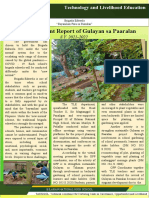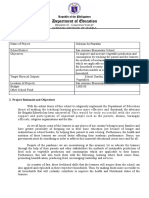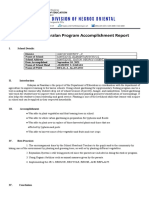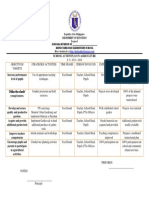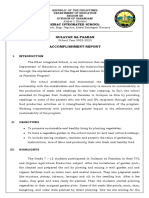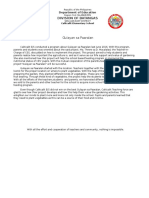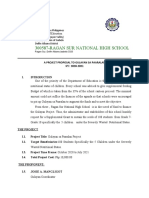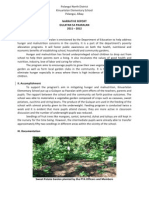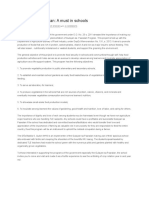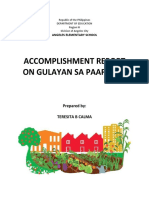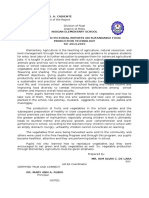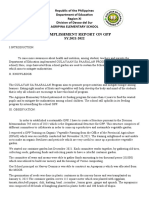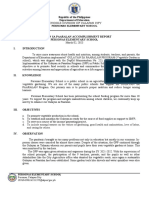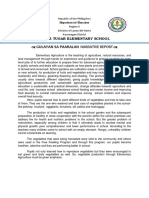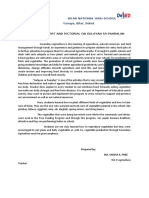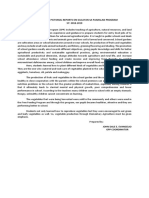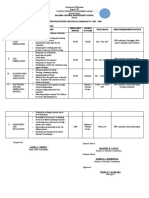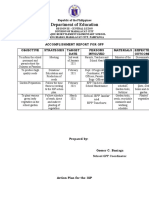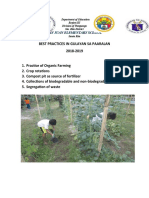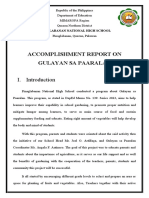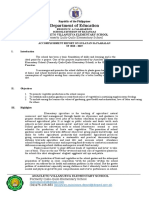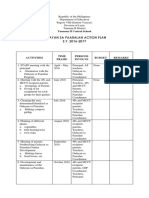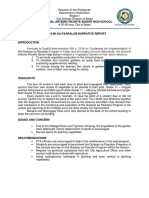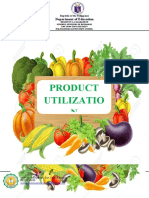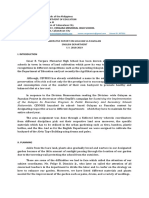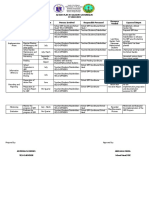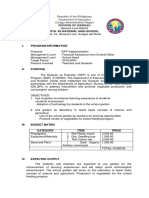100%(4)100% found this document useful (4 votes)
2K viewsGulayan Sa Paaralan Accomplishment Report
Gulayan Sa Paaralan Accomplishment Report
Uploaded by
Giancarlo Barandino1) The school garden program at South 1-A Central School aims to promote proper nutrition, mitigate hunger, and serve as an educational space for students.
2) The garden produces a variety of vegetables that are rich in proteins, vitamins, and minerals to improve student nutrition and encourage vegetable consumption.
3) During remote learning due to the pandemic, students were encouraged to do backyard gardening at home and share produce with their community, applying the gardening skills learned in school.
Copyright:
© All Rights Reserved
Available Formats
Download as DOCX, PDF, TXT or read online from Scribd
Gulayan Sa Paaralan Accomplishment Report
Gulayan Sa Paaralan Accomplishment Report
Uploaded by
Giancarlo Barandino100%(4)100% found this document useful (4 votes)
2K views3 pages1) The school garden program at South 1-A Central School aims to promote proper nutrition, mitigate hunger, and serve as an educational space for students.
2) The garden produces a variety of vegetables that are rich in proteins, vitamins, and minerals to improve student nutrition and encourage vegetable consumption.
3) During remote learning due to the pandemic, students were encouraged to do backyard gardening at home and share produce with their community, applying the gardening skills learned in school.
Original Title
529589268-Gulayan-Sa-Paaralan-Accomplishment-Report
Copyright
© © All Rights Reserved
Available Formats
DOCX, PDF, TXT or read online from Scribd
Share this document
Did you find this document useful?
Is this content inappropriate?
1) The school garden program at South 1-A Central School aims to promote proper nutrition, mitigate hunger, and serve as an educational space for students.
2) The garden produces a variety of vegetables that are rich in proteins, vitamins, and minerals to improve student nutrition and encourage vegetable consumption.
3) During remote learning due to the pandemic, students were encouraged to do backyard gardening at home and share produce with their community, applying the gardening skills learned in school.
Copyright:
© All Rights Reserved
Available Formats
Download as DOCX, PDF, TXT or read online from Scribd
Download as docx, pdf, or txt
100%(4)100% found this document useful (4 votes)
2K views3 pagesGulayan Sa Paaralan Accomplishment Report
Gulayan Sa Paaralan Accomplishment Report
Uploaded by
Giancarlo Barandino1) The school garden program at South 1-A Central School aims to promote proper nutrition, mitigate hunger, and serve as an educational space for students.
2) The garden produces a variety of vegetables that are rich in proteins, vitamins, and minerals to improve student nutrition and encourage vegetable consumption.
3) During remote learning due to the pandemic, students were encouraged to do backyard gardening at home and share produce with their community, applying the gardening skills learned in school.
Copyright:
© All Rights Reserved
Available Formats
Download as DOCX, PDF, TXT or read online from Scribd
Download as docx, pdf, or txt
You are on page 1of 3
KINDERGARTEN GULAYAN SA PAARALAN
ACCOMPLISHMENT REPORT
S.Y. 2021-2022
NARRATIVE AND PICTORIAL REPORT ON BEST SCHOOL
PRACTICES ON SUSTAINABLE FOOD PRODUCTION ON
GULAYAN SA PAARALAN
I. INTRODUCTION
“To plant a garden is to believe in tomorrow.”- Charlie Nardozzi
The School garden is an area of land with in the school ground or
nearby that embraces a variety of gardening and agricultural elements in
which school children actively help parents and other interested
community member in creating and maintaining it and also children use
the garden for learning for recreation and by eating what is harvested.
Vegetables, flowers medicinal plants trees, bushes and many other plants
are usually grown some small animals are also kept. Benefits of school
gardening can be acquired by pupils, teacher, school and community; there
are educational benefit, environmental, stewardship and connection with
nature, lifestyles and human active learning and student engagement,
student attention and management, teachers as gardeners, connection to
history and community and last but not the least, It’s a school pride.
Gulayan sa Paaralan Program is an activity which aim to promote proper
nutrition and mitigate hunger among learners. Eating right amount of
fruits and vegetables will help develop the body and mind of the students,
that is why all schools are encourage to have this kind of program. South 1-
A Central School support this program, that implements through the
leadership of Dr. Anecita B. Jao the School Principal and participated by all
the teachers and supportive parents of the school. The said program was
implemented successfully. In the New Normal Education where in Distance
Learning Education was implemented, learners were also encouraged to do
their backyard gardening at home and apply the good practices of
gardening learned at school, as part of their responsibilities in sharing and
implements consumption of vegetables among their community for a better
healthy and balance diet.
School garden is a wonderful way to use the school yard as a classroom,
reconnect students with the natural world and the true source of their food
and teach them valuable gardening and agriculture concept and skills that
integrate with several subjects. As per stated in DepEd Memorandum No.
89s 2015 also know as implementation of the Department of Education
Funded Gulayan sa Paaralan (GPP)(objectives please see p. 1 of 7 DepEd
memo No. 89 s 2015)
This Program aims to attain the following:
1.To promote vegetable production in public school;
2.To establish and maintain school garden as ready food basket/source of
vegetables in sustaining supplementary feeding;
3.To serve as laboratory for learners;
4.To produce vegetables in the school that are rich source of
protein,vitamin and minerals and eventually increase vegetables
consumption and improve learners’ nutrition;
5.To showcase small-scale food production models; and
6.To inculcate among the learners the value of gardening, good health and
nutrition, love of labor, and caring for other
II.
III.
IV.
V. CONCLUSION
Seeking to contribute to the formation of healthy lifestyle habits
among children, Nestlé Wellness Campus is part of the global Nestlé for
Healthier initiative, which aims to help learners nationwide lead healthier
and happier lives, by supporting parents on their journey to raise a
generation of healthier kids. Therefore, South 1-A Central School support
this program and Gulayan sa Paaralan was implemented to attain this goal.
Go, Grow and Glow food are present in the Gulayan respectively for
teachers, parents, and school community to harvest. Apart from nutrition
education for students, nutrition modules for parents are also shared to
ensure that what is being taught to children is also applied at home. The
parents’ modules contain the same nutrition topics, however the messages
focus more on how to address picky eaters, increase fruit and vegetable
intakes of children, and manage grocery budgets, as these are the common
nutrition-related concerns of Filipino parents. And this program is a great
avenue leading children to be healthy during this pandemic time.
You might also like
- Smart Test - )Document4 pagesSmart Test - )lJeisson SK283% (6)
- Action Plan For Gulayan Sa Paaralan 2022 2023Document3 pagesAction Plan For Gulayan Sa Paaralan 2022 2023Jef Vega90% (10)
- Accomplishment Report GulayanDocument15 pagesAccomplishment Report GulayanFiya Calma82% (17)
- Project Proposal For Gulayan Sa Paaralan 2022 2023Document7 pagesProject Proposal For Gulayan Sa Paaralan 2022 2023marloncruise100% (8)
- Gulayan Sa Paaralan Work PlanDocument3 pagesGulayan Sa Paaralan Work PlanGene Rose Ylagan88% (17)
- Gulayan Sa Paaralan Accomplishment ReportDocument3 pagesGulayan Sa Paaralan Accomplishment ReportAnthonette Calimpong Bermoy-Burgos90% (10)
- GPP Accomplishment ReportDocument3 pagesGPP Accomplishment ReportMa'am Rakii100% (4)
- Claimed by The Orc Prince (The Orc Prince Trilogy Book 1) (Hart, Lionel (Hart, Lionel) ) PDFDocument158 pagesClaimed by The Orc Prince (The Orc Prince Trilogy Book 1) (Hart, Lionel (Hart, Lionel) ) PDFParis Russo100% (1)
- Project Proposal Gulayan Sa Paaralan S.Y. 2022 2023Document4 pagesProject Proposal Gulayan Sa Paaralan S.Y. 2022 2023Jhonna Mae Salido Sales100% (7)
- Gulayan Sa Paaralan Proposal 2020-2021Document9 pagesGulayan Sa Paaralan Proposal 2020-2021Jose Paguyo100% (1)
- Gulayan Sa Paaralan Program Accomplishment Report MESDocument7 pagesGulayan Sa Paaralan Program Accomplishment Report MESprincess nicole lugtuNo ratings yet
- School Action Plan in AgricultureDocument1 pageSchool Action Plan in Agriculturejoy100% (2)
- Gulayan Sa Paaralan CaduldulaoanDocument6 pagesGulayan Sa Paaralan CaduldulaoanRonan Sibbaluca100% (6)
- Gpp-Siga Narrative Report 2021Document10 pagesGpp-Siga Narrative Report 2021ruel pelayo100% (1)
- Narrative Report GulayanDocument4 pagesNarrative Report GulayanAdor Isip91% (103)
- Gulayan Sa Paaralan 2023Document7 pagesGulayan Sa Paaralan 2023Alter Juliane SevillaNo ratings yet
- Gulayan Sa Paaralan: Program (GPP)Document12 pagesGulayan Sa Paaralan: Program (GPP)Cecille del RosarioNo ratings yet
- Narrative Report GPPDocument2 pagesNarrative Report GPPMaricar Briones Palmones80% (5)
- Gulayan-sa-Paaralan (1) Project ProposalDocument15 pagesGulayan-sa-Paaralan (1) Project ProposalLuisa Francisco Garcillan83% (6)
- Gulayan Sa PaaralanDocument2 pagesGulayan Sa PaaralanMa Teresa Ilarde Magdasoc94% (18)
- Gulayan Sa Paaralan AccomplishmentDocument28 pagesGulayan Sa Paaralan AccomplishmentMARICAR PALMONES100% (1)
- Gulayan Sa PaaralanDocument6 pagesGulayan Sa PaaralanMark Jessie Panopio Magsaysay100% (5)
- Accomplishment Report GulayanDocument12 pagesAccomplishment Report GulayanBianca nicole empeno100% (1)
- Narrative Report On Gulayann Sa PaaralanDocument3 pagesNarrative Report On Gulayann Sa PaaralanManuel Figuracion Pantaleon86% (21)
- Accomplishment Report Gulayan Sa PaaralanDocument5 pagesAccomplishment Report Gulayan Sa PaaralanMelody Cabilin100% (1)
- Accomplishment Report On Gulayan Sa Paaralan1Document9 pagesAccomplishment Report On Gulayan Sa Paaralan1joraldNo ratings yet
- Gulayan Sa Paaralan Accomplishment Report PERSONASDocument9 pagesGulayan Sa Paaralan Accomplishment Report PERSONASDivine Mercy Manalo MarasiganNo ratings yet
- Gulayan Sa PaaralanDocument3 pagesGulayan Sa PaaralanJaneDandanNo ratings yet
- Narrative Report of Gulayan Sa PaaralanDocument1 pageNarrative Report of Gulayan Sa PaaralanUniss100% (9)
- Narrative and Pictorial Report On Gulayan Sa PaaralanDocument2 pagesNarrative and Pictorial Report On Gulayan Sa Paaralansheynie100% (2)
- GPP Narrative ReportDocument1 pageGPP Narrative ReportJohn Dale Evangelio100% (1)
- Action Plan EPP and Gulayan Sa PaaralanDocument2 pagesAction Plan EPP and Gulayan Sa PaaralanMarilyn Bido100% (2)
- GPP - (S.Y. 2021-2022) ACR and Action PlanDocument2 pagesGPP - (S.Y. 2021-2022) ACR and Action Plangomer baniaga100% (3)
- Action Plan in Gulayan Sa PaaralanDocument2 pagesAction Plan in Gulayan Sa PaaralanJhun Dalingay Dumaum100% (4)
- Gulayan Sa Paaralan Work PlanDocument2 pagesGulayan Sa Paaralan Work PlanLinrose Go Reyna100% (5)
- A Narrative Report On Feeding Program 2017Document2 pagesA Narrative Report On Feeding Program 2017RALPH PADDAYUMAN0% (1)
- A Gulayan Sa Paaralan Project ProposalDocument5 pagesA Gulayan Sa Paaralan Project ProposalGiancarlo Barandino100% (2)
- Gulayan Sa Paaralan Narrative Report 2021-2022Document3 pagesGulayan Sa Paaralan Narrative Report 2021-2022Mark Gil Jalbuena Alteza100% (1)
- Best Practices in Gulayan Sa Paaralan 2018-2019: San Juan Elementary SchoolDocument11 pagesBest Practices in Gulayan Sa Paaralan 2018-2019: San Juan Elementary Schoolmaggie s. tubaonNo ratings yet
- Gulayan Sa Paaralan Accomplishment ReportDocument5 pagesGulayan Sa Paaralan Accomplishment Reportadad100% (1)
- Gulayan Sa Paaralan 2022-2023 - 040129Document5 pagesGulayan Sa Paaralan 2022-2023 - 040129Angela Fernandez AntineroNo ratings yet
- Department of Education: Republic of The PhilippinesDocument2 pagesDepartment of Education: Republic of The PhilippinesARLENE MARASIGANNo ratings yet
- Gulayan Sa Paaralan Action PlanDocument2 pagesGulayan Sa Paaralan Action PlanDerick Maceda90% (10)
- Gulayan Sa Paaralan ProgramDocument7 pagesGulayan Sa Paaralan ProgramDivine Grace Samortin75% (4)
- Accomplishment Report - Gulayan Sa Paaralan 2022-2023Document6 pagesAccomplishment Report - Gulayan Sa Paaralan 2022-2023LizBay100% (1)
- Action Plan in Epp Agriculture (Sy 2016-2017)Document1 pageAction Plan in Epp Agriculture (Sy 2016-2017)Eugene Octaviano Barila100% (1)
- EPP Accomplishment Report S.Y. 2016-2017Document6 pagesEPP Accomplishment Report S.Y. 2016-2017Jane Agne-Talinio100% (2)
- Accomplishment Report in Epp 2020-2021 CesDocument15 pagesAccomplishment Report in Epp 2020-2021 CesJan Antoni Racelis100% (1)
- Narrative Report School Based Feeding Program Orientation September 12 2023Document3 pagesNarrative Report School Based Feeding Program Orientation September 12 2023Alvin Gajerana Flores100% (1)
- Gulayan Sa Paaralan Narrative ReportDocument3 pagesGulayan Sa Paaralan Narrative ReportJoe Jayson Caletena67% (12)
- Gulayan Sa Paaralan 2021Document81 pagesGulayan Sa Paaralan 2021May Anne Almario100% (5)
- 2023-2024 Action Plan For Gulayan Sa PaaralanDocument2 pages2023-2024 Action Plan For Gulayan Sa PaaralanNestor Conarco100% (10)
- Gulayan Sa Paaralan Action PlanDocument2 pagesGulayan Sa Paaralan Action PlanMatie Ramos75% (4)
- Gulayan Sa Paaaralan Narrative ReportDocument4 pagesGulayan Sa Paaaralan Narrative ReportChristian Jay Umali100% (1)
- Action Plan-Gulayan Sa PaaralanDocument2 pagesAction Plan-Gulayan Sa PaaralanMarian Oclinaria96% (73)
- Action Plan in Gulayan Sa Paaralan 2018mam DionesDocument2 pagesAction Plan in Gulayan Sa Paaralan 2018mam DionesJohn Dale Evangelio100% (12)
- Post Activity Report On Nursery EstablishmentDocument4 pagesPost Activity Report On Nursery EstablishmentMaria Lourdes Oracion100% (1)
- Gulayan Sa Paaralan Best PracticesDocument1 pageGulayan Sa Paaralan Best Practicesjulie joy75% (4)
- GPP Project ProposalDocument4 pagesGPP Project Proposaljoris sulima100% (2)
- SBFP Narrative Report - 2021-2022 - ClerigoDocument4 pagesSBFP Narrative Report - 2021-2022 - ClerigoErich Benedict Clerigo100% (5)
- Gulayan Sa Paaralan at Tahanan ProposalDocument6 pagesGulayan Sa Paaralan at Tahanan ProposalWendy Dalere BalisacanNo ratings yet
- Narrative and Pictorial Reports On Gulayan Sa Paaralan ProjectDocument2 pagesNarrative and Pictorial Reports On Gulayan Sa Paaralan Projectjane dacdacNo ratings yet
- New TLE 6 2nd Periodical TestDocument5 pagesNew TLE 6 2nd Periodical TestGiancarlo BarandinoNo ratings yet
- BFP Letter RequestDocument1 pageBFP Letter RequestGiancarlo BarandinoNo ratings yet
- 101 Data InterpretationDocument17 pages101 Data InterpretationGiancarlo BarandinoNo ratings yet
- Annual Implementation Plan AIP Calendar Year 2017 000Document8 pagesAnnual Implementation Plan AIP Calendar Year 2017 000Giancarlo BarandinoNo ratings yet
- A Gulayan Sa Paaralan Project ProposalDocument5 pagesA Gulayan Sa Paaralan Project ProposalGiancarlo Barandino100% (2)
- Propose GulayanDocument5 pagesPropose GulayanGiancarlo BarandinoNo ratings yet
- Annual Implementation PlanDocument9 pagesAnnual Implementation PlanGiancarlo BarandinoNo ratings yet
- School Action Plan On Gulayan Sa Paaralan ProgramDocument8 pagesSchool Action Plan On Gulayan Sa Paaralan ProgramGiancarlo BarandinoNo ratings yet
- TLE 6 Diagnostic TestDocument5 pagesTLE 6 Diagnostic TestGiancarlo BarandinoNo ratings yet
- Review MaterialsDocument75 pagesReview MaterialsGiancarlo BarandinoNo ratings yet
- Action Plan in GulayanDocument4 pagesAction Plan in GulayanGiancarlo BarandinoNo ratings yet
- DCLR in Filipino 5 Quarter 2 Week 8Document11 pagesDCLR in Filipino 5 Quarter 2 Week 8Giancarlo BarandinoNo ratings yet
- Efectos de Envases y Sellados de Botella Sobre Sauvignon Blanc Chileno y Sus Compuestos Volátiles.Document15 pagesEfectos de Envases y Sellados de Botella Sobre Sauvignon Blanc Chileno y Sus Compuestos Volátiles.CamiloNo ratings yet
- VAP-18 Daily ReportDocument10 pagesVAP-18 Daily ReportsagarNo ratings yet
- Group 1-Reporting GuidelinesDocument2 pagesGroup 1-Reporting GuidelinesHoney Lee Roja100% (1)
- Penjualan Sales 1650975283732Document27 pagesPenjualan Sales 1650975283732Muhammad SeptiantoNo ratings yet
- Industrial Training ReportDocument17 pagesIndustrial Training ReportYashoda MahajanNo ratings yet
- Annual Marketing PlanDocument14 pagesAnnual Marketing Plan20181330No ratings yet
- RM A2 SB Grammar BankDocument20 pagesRM A2 SB Grammar BankMaria Leandra Calello100% (1)
- High Score IBT TOEFL Reading For Junior 2Document204 pagesHigh Score IBT TOEFL Reading For Junior 2ivygoerNo ratings yet
- LP Basic Preparation of MeatDocument8 pagesLP Basic Preparation of MeatMiriam Mangaoang DoñosNo ratings yet
- SAMPLE HACCP PLAN FOR NO COOK FOOD Prepared byDocument2 pagesSAMPLE HACCP PLAN FOR NO COOK FOOD Prepared byyounelNo ratings yet
- The Past Decade A Great Source of Is Detrimental To of The Feed Than Raising Livestock Expected To BeDocument2 pagesThe Past Decade A Great Source of Is Detrimental To of The Feed Than Raising Livestock Expected To BeNguyễn Thị Hiền NhiNo ratings yet
- 15a Lot of Charm, 16a Lot of Personality and 17many Friends. But She Hasn't Got 18muchDocument6 pages15a Lot of Charm, 16a Lot of Personality and 17many Friends. But She Hasn't Got 18muchChale IssufoNo ratings yet
- Soal TryOut B.Inggris 2018 Dan Kunci JawabanDocument15 pagesSoal TryOut B.Inggris 2018 Dan Kunci JawabanFifinzNo ratings yet
- M. Valerio Assignment 6.1Document1 pageM. Valerio Assignment 6.1Mark Kristian ValerioNo ratings yet
- Activity 9 Refrigeration - FreezingDocument2 pagesActivity 9 Refrigeration - FreezingHazel Ruiz OriolaNo ratings yet
- Preparing Vegetable DishesDocument23 pagesPreparing Vegetable DishesSan Isidro AgnesNo ratings yet
- Reviewer in Cookery 10Document93 pagesReviewer in Cookery 10Arneil RealizaNo ratings yet
- 4 - Kinds and Methods of Mixing DoughDocument21 pages4 - Kinds and Methods of Mixing DoughRAYMART SARBODANo ratings yet
- Drying & Dehydration GuideDocument49 pagesDrying & Dehydration GuideRaghvendra SinghNo ratings yet
- KARTU-SOAL-BAHASA-INGGRIS - X MipaDocument43 pagesKARTU-SOAL-BAHASA-INGGRIS - X MipaNasrullah20 NasrullahNo ratings yet
- Denheath Custard SquaresDocument1 pageDenheath Custard SquaresAndrew SullivanNo ratings yet
- Summary Essay OutlineDocument4 pagesSummary Essay Outlinelpuaduwhd100% (2)
- General Paper 2 Term 2: Nyamupfukudza Primary SchoolDocument3 pagesGeneral Paper 2 Term 2: Nyamupfukudza Primary Schooljordan thunderNo ratings yet
- Foopak CatalogueDocument37 pagesFoopak CatalogueKathy CulleyNo ratings yet
- Using Calamansi and Aloe Vera As A Hand Sanitizer PDF FreeDocument60 pagesUsing Calamansi and Aloe Vera As A Hand Sanitizer PDF FreeMilcah Shane Niones Saren0% (1)
- Cocktail List Ufficiale Iba 2020Document49 pagesCocktail List Ufficiale Iba 2020John TechNo ratings yet
- OljDocument7 pagesOljclowncoreNo ratings yet
- Agricultral and Commodity Marketing Chapter 2Document11 pagesAgricultral and Commodity Marketing Chapter 2Asaminow GirmaNo ratings yet






